About
Health + Wellness
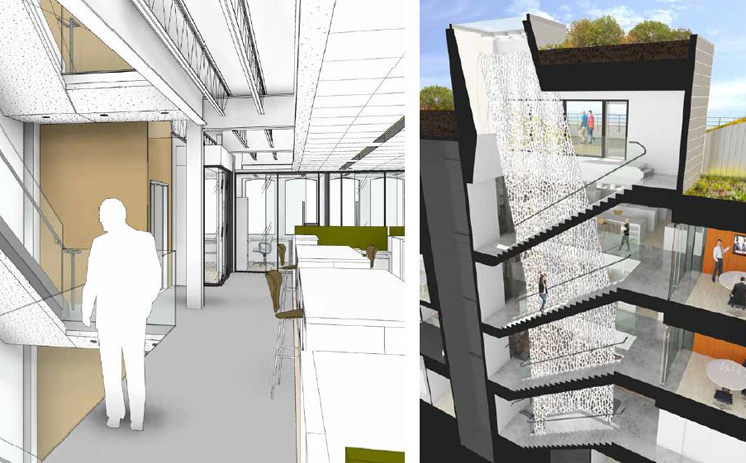 Daylight through the stairwells, conceptual rendering / Gensler
Daylight through the stairwells, conceptual rendering / Gensler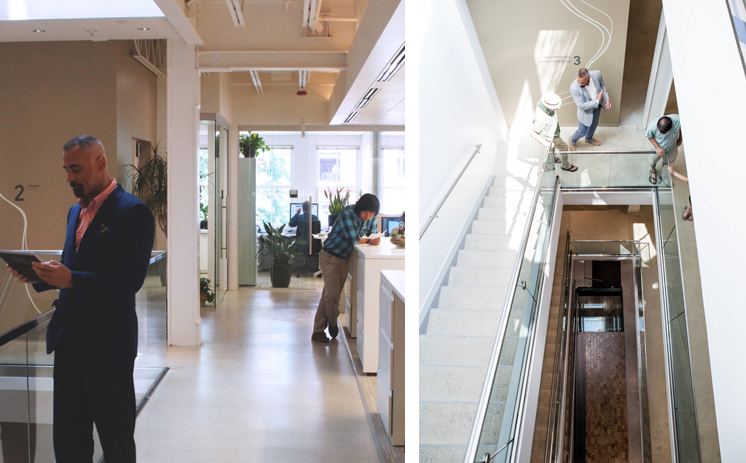 ASLA Center for Landscape Architecture / ASLA
ASLA Center for Landscape Architecture / ASLA
The American Society of Landscape Architects has been recognized as a leader in supporting the health and wellness of its employees, providing benefits and incentives that promote a work-life balance and encourage fitness and active lifestyles.
ASLA offers subsidies and incentives and on-site fitness and wellness programs, including fresh, organic fruit; a treadmill desk; standing desks; fitness classes suitable for a range of fitness levels; and quarterly wellness-promoting activities, such as walking challenges, stress management classes, and nutrition and cooking demonstrations. ASLA has received numerous Best Workplace for Commuter awards and wellness awards from SmartCEO magazine and the Washington Business Journal.
Given ASLA’s strong commitment to health and wellness, pursuing LEED Platinum and WELL Gold certifications for the Center for Landscape Architecture was a no-brainer. The WELL Building Standard® is a performance-based standard focused on human health and wellness that began as a Clinton Global Initiative commitment by Delos founder Paul Scialla. WELL is based in design and construction best practices and evidence-based health and wellness interventions. The WELL Building Standard is organized around seven concepts: air, water, light, fitness, comfort, mind, and nourishment.
Project certification under the WELL Building Standard v1 was launched in 2014, with Green Business Certification Inc. providing third-party certification. The ASLA Center for Landscape Architecture is the largest WELL certified and first WELL Certified Gold project in Washington, D.C.
Here is how the new Center improves the health and wellness of its employees and visitors:
Air: The WELL standard promotes clean air by reducing or minimizing indoor air pollution. Extensive performance tests were conducted for volatile substances, particulate matter, and inorganic gases. An operation schedule is in place for periodic air quality testing and filter replacement.
To enhance air circulation, moisture management, and ventilation, ASLA replaced its conventional HVAC with a variable refrigerant flow (VRF) system. VRF brings in natural air from outside the building, filters it to a pure level, and then heats and cools it for different zones of the building in a more refined manner. The system enables greater energy efficiency and features smaller ducts, with reduced noise. In addition to the VRF system, ASLA maintained its operable windows to allow natural ventilation.
All furniture and materials meet the new, low volatile organic compounds (VOC) limits approved by the California Department of Public Health, which meets both LEED and WELL requirements.
ASLA’s cleaning protocol is in accordance with WELL’s standard. All cleaning products used in the building -- and the location and frequency of their use -- must be approved by ASLA. In addition, all products must be certified by the Environmental Protection Agency’s Design for the Environment, Underwriters Laboratories’ EcoLogo or Green Seal. No bleach or ammonia-based cleaning products are used or stored in the building.
Water: Following the WELL Standard’s principle that clean drinking water is a prerequisite for optimal health, ASLA performed a broad initial assessment of water quality, testing for fundamental water quality, inorganic contaminants, agricultural contaminants, and public water additives. The initial assessment detected no contaminants. Filtration stations and drinking fountains have carbon filters. An operations schedule for quarterly water quality testing is in place.
Light: Daylight, which is critical to employee and visitor health and well-being, floods the building with the help of a new rooftop skylight and stair atrium, which distributes natural light. The design of the building purposefully spreads natural light throughout new space.
Workstation and office layouts maximize access to light from windows and
skylights. Office fronts and meeting spaces have glass walls and
surfaces and finishes are low glare. A supplementary, state-of-the-art,
circadian lighting – cool, blue light -- at employee desks mimics the
natural properties of daylight and supports the body’s natural wake and
sleep cycles.
 Daily light cycle in building, conceptual rendering / Gensler and Stroik
Daily light cycle in building, conceptual rendering / Gensler and Stroik
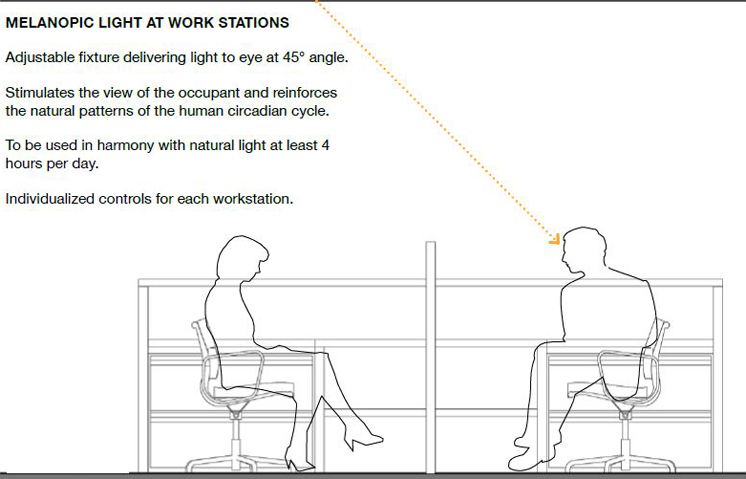 Lighting approach, conceptual rendering / Gensler and Stroik
Lighting approach, conceptual rendering / Gensler and Stroik
Fitness: ASLA is committed to supporting the health and wellness of its employees through benefits and incentives that promote work-life balance and encourage fitness and active lifestyles. To that end, ASLA offers an array of subsidies and incentives to employees, including active transportation subsidies, gym reimbursements, entrance fees for races, subsidized fitness or training programs and bicycle share memberships.
On-site fitness classes, suitable for a range of fitness levels, are offered three times per week. Staff may attend any two of the three classes offered as work time. If preferred, staff may use the scheduled fitness time slots to pursue separate fitness activities, e.g., running.
Quarterly activities that promote wellness include classes on fitness education, stress management, guided relaxation, ergonomics, nutrition/cooking, financial well-being, and other work/life and well-being issues.
The design of the Center reinforces the WELL Standard for "interior fitness circulation" by encouraging use of the visually-attractive open staircase that melds with the central, light-filled atrium. The Center also offers a treadmill desk, fitness equipment, bicycle storage, showers, and sit/stand units for keyboards and monitors.
Comfort: Thermal comfort, acoustic comfort, ergonomics, and beauty and design play a large role in enhancing social interaction, productivity, and employee satisfaction and well-being in the built environment.
To enhance thermal comfort, ASLA replaced its conventional HVAC with a variable refrigerant flow (VRF) system (see above in the air section).
For acoustic comfort, noise-absorbing wall, ceiling, and floor materials, along with a comprehensive white-noise system, were used to soften the impact of busy workplace sounds. All conference rooms and breakout rooms are designed to reduce noise. Printing / copying areas and restrooms are located away from employee areas to minimize disturbances.
ASLA worked closely with design partners Gensler and Haworth/Price Modern to maximize ergonomic comfort and safety. All computer screens are adjustable in terms of height and distance. More than 30 percent of workstations use adjustable height sit-stand desks. Employees are given a choice of workstation chairs that fully comply with ergonomic requirements.
Mind: The ASLA Center integrates features of the WELL Standard in its physical design, incorporating aesthetically-pleasing elements into the space to help create a calming environment.
A dedicated wellness room provides employees a private space for quiet time. Multiple showers and bike lockers help employees feel comfortable running or biking to work.
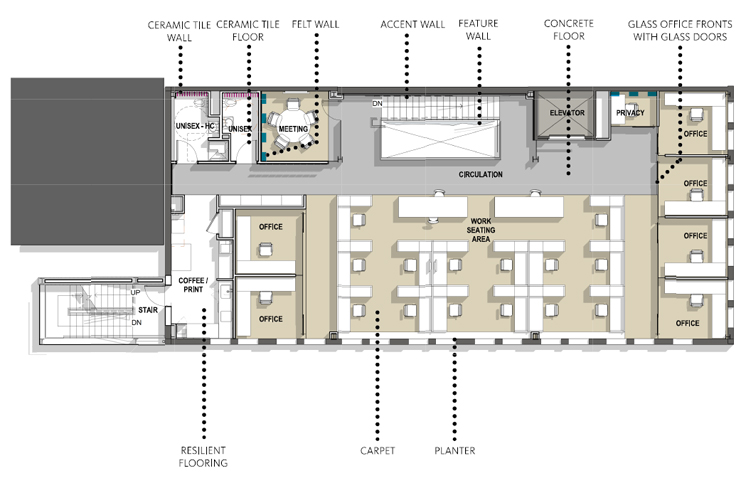 Third floor bathroom with shower, rendering / Gensler
Third floor bathroom with shower, rendering / Gensler
 Wellness room on ground level, rendering / Gensler
Wellness room on ground level, rendering / Gensler
Biophilic elements, such as plants, lighting, and natural wood, fibers, materials, and patterns, are used throughout the interior and
exterior to nurture our innate connection to nature.
 Materials palette / Gensler
Materials palette / Gensler
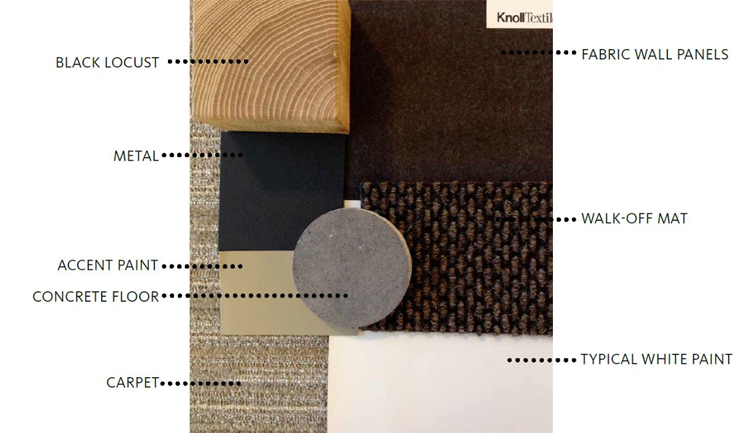 Materials palette / Gensler
Materials palette / Gensler
Materials used in the building are also featured in the new outdoor patio, further creating a sense of connection to the outdoors.
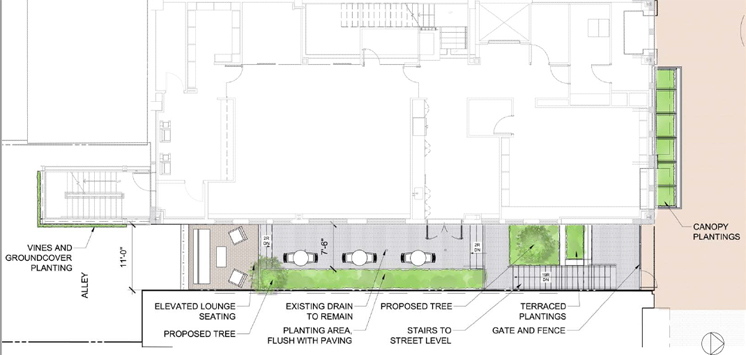 Garden view, conceptual rendering / Gensler and Oehme, van Sweden
Garden view, conceptual rendering / Gensler and Oehme, van Sweden
 Pavers / Gensler and Oehme, van Sweden
Pavers / Gensler and Oehme, van Sweden
In addition to physical design, ASLA implemented a number of workplace
policies on healthy sleep, business travel, stress and addiction
treatment and altruism, among others that positively impact mood, sleep,
stress levels and psycho-social status in order to promote and enable
overall occupant health and well-being. ASLA will annually survey
employees on thermal, acoustic, and ergonomic comfort and
report the results back to the International Well Building Institute.
Nourishment: ASLA has long been an advocate of healthy eating and physical activity among its employees and volunteers. When the Society decided to adopt the WELL Standard, many required practices were already in place. The Standard requires design strategies and operational policies that increase access to healthy food options and thus increase well-being.
The implementation of WELL policies has created a good dialogue with employees on health, food, and fitness. Crafting policies requires the collaboration of many internal departments along with outside vendors who serve and produce food to our employees and volunteers.
 Tasty and healthy options at the ASLA Center for Landscape Architecture opening reception / ASLA
Tasty and healthy options at the ASLA Center for Landscape Architecture opening reception / ASLAASLA is committed to providing healthy, nutritious food for its staff and volunteers. All catered meals adhere to the following:
- All organic produce.
- All meat, eggs, and dairy products will be certified organic and humanely raised.
- Whenever possible, food shall be locally produced.
- At least two varieties of fruit (with no added sugar) and two varieties of non-fried vegetables will be provided.
- No beverages with more than 30g of sugar per serving.
- In any foods that contain a grain flour, whole grain is the primary grain ingredient by weight.
- No partially-hydrogenated (trans fat) oils.
- Foods will be clearly labeled to identify the following allergens: peanuts, fish, shellfish, soy, milk and dairy products, egg, wheat, tree nuts, gluten.
- No foods containing artificial colors, artificial flavors, artificial sweeteners, brominated vegetable oils, potassium bromate, BHA, and BHT.
- Foods will be clearly labeled to show total calories; total protein, fat, and carbohydrate content by weight and as a percent of FDA estimated daily requirements; micronutrient content (vitamins A, C, and calcium and iron) by weight and as a percent of FDA estimated daily requirements; and total sugar content.
- All meals will include the option of a portion that is 650 calories or fewer.
- In addition, ASLA has policies in place on hand washing, nutritional messaging, and safe food preparation materials.